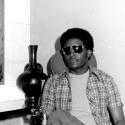Eliza Carthy has been busy, as she always has. Recording various albums with various artists during the pandemic, her show with her band, The Restitution (and many others), at the Barbican on Saturday, was well stuffed with music, musicians, laughter, familial connections and celebrations.
Arguably the reigning queen of folk in England, Eliza has inspired a generation (including a friend of mine whose imaginary friend she was), simultaneously reinventing the form and honouring her roots, the melodies and lyrics brought once more to life. This concert was an excellent way of showing this evolution, perhaps not one for the purists but certainly a reminder (for a very white-haired audience) that change is not always a bad thing.
Her father, Martin, one of the last of the previous era of folk musicians (whose 80th birthday was belatedly celebrated here), was the first onstage, accompanied by an enthusiastic ovation. His voice, whilst at times betraying his years, was confident and wonderfully familiar, two spots lighting him as he sung "High Germany". For the next song, he was joined by cello and sitar to play "Scarborough Fair" with a newer tune (one that he joked that he couldn’t remember). The low buzz of the cello and the gentle sonority of the sitar leant richness and further complication to a song that is never too old to be reinterpreted. Martin then described the memories associated with his next song, going back 65 years to "The Dream of Napoleon". Eliza joined him onstage, blue hair, blue velvet dress, long red ribbons around her wrist, and the beautiful, playful sound of her fiddle. In this song, as in many of those throughout the concert, space was given to skilled, intricate instrumentation.
"John Barleycorn" was another familiar tune, harking back to the folk supergroup The Imagined Village’s 2007 album. Martin, misreading the set list, came back on stage after leaving, to play a final song from the 2010 follow-up, the contemporary "My Son John", which formed a fitting companion to "High Germany", with their lamentations of war and loss.
Eliza returned to the stage to introduce songs that honoured her mother, Norma Waterson, who died during the pandemic. First was Loudon Wainwright’s, "Dreaming", a mournful piano, a softly plucked double bass, and Eliza’s voice joined by her extraordinarily dextrous fiddle. This was followed by "Wayfaring Stranger", introducing a country strain that ran through the concert. Martin returned to sing "The Widow's Party", his voice a quiet counterpoint to hers. A wonderful medley of "Lost in the Stars" and Monty Python’s "The Galaxy Song" proceeded, then a song that Eliza wrote for her aunt, Lal Waterson, another of the lost old guard.
Following the interval, the family’s band, The Gift, was replaced by Eliza’s, The Restitution, a much fresher outfit, starting with an electric guitar for the Anne Briggs standard, "The Snow it Melts the Soonest". Eliza brought her fiddle back for the "Whirly Whorl", a sawing reel that recalled her earlier output. Next, "The Black Queen", another romantic ballad about loss, accompanied by piano. The band blasted back in with a piratical feel for "Blood on My Boots", a rollicking energy that gave way to the reflective "My Father's Mansion", then the plaintive "Pretty Plough Boy", the folk classic of a girl who is far too good for this world.
"Stumbling On" followed, a song written by Lal. Eliza pulled audience members onstage for "Good Morning, Mr Walker", including a behatted and besunglassed man, who appeared in the video for the song, and danced very well. Eliza is clearly a musician who, despite bemoaning her tiredness earlier on in the concert, loves performing and is very good at doing so.
Every musician who had played that night returned to the stage for the final minutes, including Martin, who sung "Bunch of Thyme" with his daughter, he on guitar, she on fiddle, just the accordion and cello accompanying them. An emotional goodnight was sung to the audience, just voices now, thus ending an evening that was as much about the losses of the folk past as the promises of its future.














Add comment